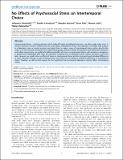No Effects of Psychosocial Stress on Intertemporal Choice
Author(s)
Haushofer, Johannes; Cornelisse, Sandra; Seinstra, Maayke; Fehr, Ernst; Joels, Marian; Kalenscher, Tobias; ... Show more Show less
DownloadHaushofer-2013-No effects of psycho.pdf (227.5Kb)
PUBLISHER_CC
Publisher with Creative Commons License
Creative Commons Attribution
Terms of use
Metadata
Show full item recordAbstract
Intertemporal choices - involving decisions which trade off instant and delayed outcomes - are often made under stress. It remains unknown, however, whether and how stress affects intertemporal choice. We subjected 142 healthy male subjects to a laboratory stress or control protocol, and asked them to make a series of intertemporal choices either directly after stress, or 20 minutes later (resulting in four experimental groups). Based on theory and evidence from behavioral economics and cellular neuroscience, we predicted a bidirectional effect of stress on intertemporal choice, with increases in impatience or present bias immediately after stress, but decreases in present bias or impatience when subjects are tested 20 minutes later. However, our results show no effects of stress on intertemporal choice at either time point, and individual differences in stress reactivity (changes in stress hormone levels over time) are not related to individual differences in intertemporal choice. Together, we did not find support for the hypothesis that psychosocial laboratory stressors affect intertemporal choice.
Date issued
2013-11Department
Massachusetts Institute of Technology. Department of Economics; Abdul Latif Jameel Poverty Action Lab (Massachusetts Institute of Technology)Journal
PLoS ONE
Publisher
Public Library of Science
Citation
Haushofer, Johannes, Sandra Cornelisse, Maayke Seinstra, Ernst Fehr, Marian Joels, and Tobias Kalenscher. “No Effects of Psychosocial Stress on Intertemporal Choice.” Edited by Mathias Pessiglione. PLoS ONE 8, no. 11 (November 8, 2013): e78597.
Version: Final published version
ISSN
1932-6203